
by admin | Jun 29, 2021 | Uncategorized
Have you ever heard that 90% of millionaires invest/own real estate? Believe it or not, it’s true! There’s a reason the wealthiest people invest their money into real estate – but, like any investment, it does come with it’s pros and cons.
Let’s get to it. Today I’m going to walk you through a few of the pros and cons to owning real estate.
Let’s start with the good parts:
- Real estate is a great investment because it appreciates over time. While there are occasional market fluctuations, if you buy at the right time, the rate of appreciation generally far outpaces annual inflation.
- Becoming a homeowner has unique tax benefits that allow you to grow your wealth over time.
- Rental properties provide steady cash flow! Cash flow provides ongoing, monthly income that is mostly passive.
- Real estate builds equity. While your tenant is paying the monthly mortgage payment, your increasing your net worth and paying down an asset that you can continue to rent or eventually sell and make a profit
Now for the cons of owning real estate:
- Owning real estate requires money. You’ll need funds for a down payment, repairs, updates, as well as regular maintenance, expenses, insurance, and property taxes.
- There’s a learning curve that comes with owning real estate. It’s important to know which properties are good investments, and how to manage them after purchasing.
- Investing in real estate also comes with its own set of risks. Buying at the wrong time, increased liability, getting over-leveraged. You need to be able to make money at the end of your monthly payments, despite unforeseen issues or repairs that may arise.
A real estate investment is an amazing chance to provide steady cash flow, substantial appreciation, and tax advantages – making it a sound investment. Just make sure you’re ready to consider the important factors at play.
And as always, feel free to ask me any questions you may have! I’d love to help you find your next investment property.

by admin | May 17, 2021 | Uncategorized
Luxury homes are generally described as those in the top 10% of their market. Luxury homes are usually located in the most optimal areas in a market, are large in size, and built with high-end materials. Luxury homes often have unique design elements and amenities not found in most homes. Want an indoor shooting range, a rock-climbing wall, a ballroom, or a bowling alley? A luxury home might have one of these– or all of them!
If you have not purchased in the luxury market before, you should be aware that the process can be very different from buying a standard single-family home. Here are some tips to help you navigate your way through the luxury home market.
1) Be patient. Shopping for a luxury home may take longer than average. For one, there are not as many of them, which, of course, is what makes them special. Since many luxury homes have décor or features that are distinctive, quirky or eccentric, finding one that fits your style may take a little while. The closing process may also take longer as there is more to inspect, more to negotiate on, and often special circumstances to be worked out. Make sure you are getting what you want. When you are investing millions of dollars in a home, you want to make sure you don’t settle.
2) Know where to look. Luxury homeowners, particularly if they are high-profile people in their area, often don’t want their home pictured on MLS. You may need to network with people in your desired area to find out what homes are being offered. Look online for luxury home sales websites such as mansionglobal.com or luxuryportfolio.com.
3) Check for possible planned development. Don’t assume that the lovely pond or wooded park behind the property will always be there. Make sure you know of any development plans that may affect your view, the amenities around the property, and the future resale value. You don’t want to buy a home for its beautiful ocean or mountain views only to find out another property will be built in the way.
4) Consult with your financial advisors. Make sure you qualify for the purchase amount you are thinking about. Luxury home sellers will often want to see proof that you qualify to purchase their home before they even allow a showing. If you do get a showing, you will certainly need to have your financial preparations done before you contemplate an offer. Everything is scrutinized more closely in the luxury price range. You should also make yourself aware of all the financing options available to you.
5) Work with an experienced luxury home agent. The right agent knows all of these tips and more. We are knowledgeable in the high-end neighborhoods in our market area and understand the intricacies of negotiating and closing on luxury homes. Are you ready to purchase a luxury home? I’m available and ready to help you in your search!

by admin | Mar 17, 2021 | Uncategorized
Building a custom home is hard work that is rewarded when you move into the home of your dreams. The first step is finding the perfect lot to build on. Before you purchase a lot to build on, be aware of these do’s and don’ts.
Do work with an agent to find the land. Your real estate agent can help to research the property and make sure that you are making a safe investment. Buying vacant land is different than buying a home; work with an agent who knows what questions to ask and knows how to negotiate on your behalf.
Do have your finances in order. You will need to have proof of funds for the purchase amount, so make sure you understand what you can afford to spend on your lot.
Do find out what utilities service the area. If you are looking outside of a developed area, you need to know what utility services are available already, or if any infrastructure needs to be added.
Do find out if incentives are available. In areas where natural disasters have occurred, local governments may offer incentives for building where previous homes have been destroyed.
Do visit the tax assessor’s office. The tax assessor will be able to tell you the estimated value of your lot as well as your projected property taxes.
Do price the neighborhood. Your agent can help you with a market analysis of the surrounding homes. You don’t want your home and land cost to be vastly higher than the rest of the neighborhood.
Don’t expect to finance your lot. Lenders often don’t lend money for vacant land, and if they do, they may only lend up to half the land value. This is why it’s so important to talk to your financial advisors before you start looking.
Don’t skip the soil tests. You should have the soil tested to make sure there aren’t pollutants or foreign materials buried beneath the surface. If you will have a septic sewer system, you will need a percolation test to make sure the property is fit for a septic tank. In areas where sinkholes are common, a soil test can tell you if clay layers deep in the soil make your property more susceptible to foundation issues.
Don’t forget to get a survey done. Before you purchase the lot, ask to see a recent survey or have one done to validate property lines and make sure other neighbors aren’t already encroaching on the lot with access roads, fencing, or structures.
Don’t let neighbors know of your plans. Don’t get too friendly just yet. If the land you plan to build on has been enjoyed by nearby property owners for the view, for parking, or for recreation, your plans to build may be met with resistance.
Don’t assume you can have property rezoned. Make sure you know the property zoning regulations for the property. If you are in a rural area and plan to have chickens or horses, make sure that is permitted. Be wary of sellers who tell you that you can subdivide the land or build two homes on one lot, as this may not be the case.
Don’t rely on a drive-by. You need to walk the property, no matter the size or your plans for its use. If you are buying multiple acres, don’t assume that the topography is consistent throughout with no hidden problems. Things to check for include flood-prone areas, environmentally protected-animal dwellings, trash deposits and neighbors that are involved in activities that may affect your enjoyment of the property, such as dog kennels or shooting ranges.

by admin | Feb 2, 2021 | Uncategorized
We all want people to love our home as much as we do, but especially when you are trying to sell it! While it’s impossible to please every buyers’ taste, there are several easy things you can do to make your home more appealing without spending a lot of money. Try some of these tricks and see if your showings cause buyers to swoon.
- Check your curb appeal. Take an honest look from the curbside. What are buyers seeing first? If your home needs to be painted or pressure washed, consider making that investment. Clean up landscaping by trimming trees and bushes, planting some fresh annuals and laying new mulch. Clean windows, repair sagging soffit, or porch railings, and have any trip hazards on your driveway or front walk repaired. Finally, consider some attractive, yet subtle decorations for your front porch.
- Create an inviting entryway. When buyers step inside your front door, you want them to feel welcomed. If you have a foyer or front hall, it is easier to make an attractive entryway, but even if your front door opens right into your living room, you can create the feel of an entryway with a couple of simple tricks. Clear the area of clutter things that tend to pile up at the front door, like backpacks, dog leashes, or shoes. Place a small table or bench beside the door with plants, candles, or other simple décor. A small area rug can help define the space as the entryway.
- Let the light shine in. Take advantage of natural light as much as you can. Trimming any bushes or trees outside your windows can help immensely. Wash your windows inside and out and replace or remove any worn screens. Make sure to open blinds or curtains before all showings.
- Add some fresh color. Painting is an easy and inexpensive way to make an older home look new and is especially important if your current wall color is dark or outdated. Choose a light neutral color like a warm grey or light beige and use the same color throughout the house. If your home tends to be dark, this will help brighten it up.
- Let storage spaces speak for themselves. Many sellers make the mistake of waiting until they have a contract to start cleaning out closets. Cleaning out clutter is part of getting ready to show, not just getting ready to move. You want buyers to perceive that there is ample storage in the home, and this doesn’t work if every drawer, cabinet, and closet is stuffed to the gills.
- Eliminate distractions. Streamline your decorating so your buyers see the house and not your collection of Mexican roosters. Go ahead and pack up collectibles and family photos and keep decorative touches to the minimum. Too many plants, magazines, or toys distract the buyers from seeing the home as their own.
- Entice them with outdoor space. The back yard shouldn’t be an empty space of infinite possibility, nor should it be a storage area for neglected toys. Get rid of any eyesores you’ve been avoiding dealing with, spruce up your landscaping, repair irrigation or pool issues, and create an entertaining space with a patio set, or a backyard oasis with some potted plants and a hammock.
- Make it easy for them. Taking care of minor repairs is another step you can take to help buyers see your home as an easy and comfortable move. You want them to be mentally arranging their furniture as they walk through, not making a list of nicked woodwork, torn window screens, and leaky faucets. The less work involved, the easier it is to fall in love.

by admin | Jan 17, 2021 | Uncategorized
Are you thinking about investing in real estate in 2021? It may be the perfect year to purchase a rental property, a vacation home, or to flip houses. I would be happy to help you find the perfect investment property, and I’ve put together this list of tips to help you get the best return on your investment.
First, consider what type of investment property is best for you and your family.
If you are thinking about a rental property, such as a vacation condo or rental home, consider how much time will be needed for things like maintenance, managing a website or rental listings, and vetting potential tenants. For rental homes, make sure the areas you are searching are attractive to tenants in terms of proximity to nearby business centers and transportation hubs, and in good school districts for family tenants.
Is a family vacation property more to your liking? Make sure you read any and all rules pertaining to owners and guests, as well as rules on renting your property out when you are not using it, if that is something you plan to do. Also be sure that your vacation property is somewhere you foresee your family wanting to travel to often enough to make it worthwhile.
For new house flippers, you want to find out what return you can expect to get in your market area and talk to contractors and suppliers to get realistic estimates on renovations, both in terms of price and time to completion.
Here are some additional Do’s and Don’ts for investing in real estate:
Do aim for at least a 15% return on investment.
Do look for homes priced in the low end of the median price range.
Do look for 3-bedroom, 2-bath single family homes for rentals or flipping.
Do focus on one neighborhood or area.
Do purchase rental properties close to your home if you plan to manage them yourself.
Do use one real estate agent to help with all your buying and selling needs.
Don’t purchase a second property until the first is earning revenue.
Don’t buy properties that you wouldn’t want to manage, even if you plan to use a property manager.
Don’t buy a home that you cannot afford to carry for several months in case of a slow market.
Don’t buy a home or condo without having inspections performed.
Don’t buy without title insurance.
Don’t buy more properties than you are able to manage.
As I said, I can help you search for investment properties. Sometimes buyers make the mistake of searching on their own and contacting the sellers or listing agents directly. Working with several different people wastes your time and increases the chances that you will miss out on a deal. Also, working with one agent allows that agent to learn your tastes, needs, and parameters, so I can be out looking for the right property while you are busy doing other things.






Recent Comments